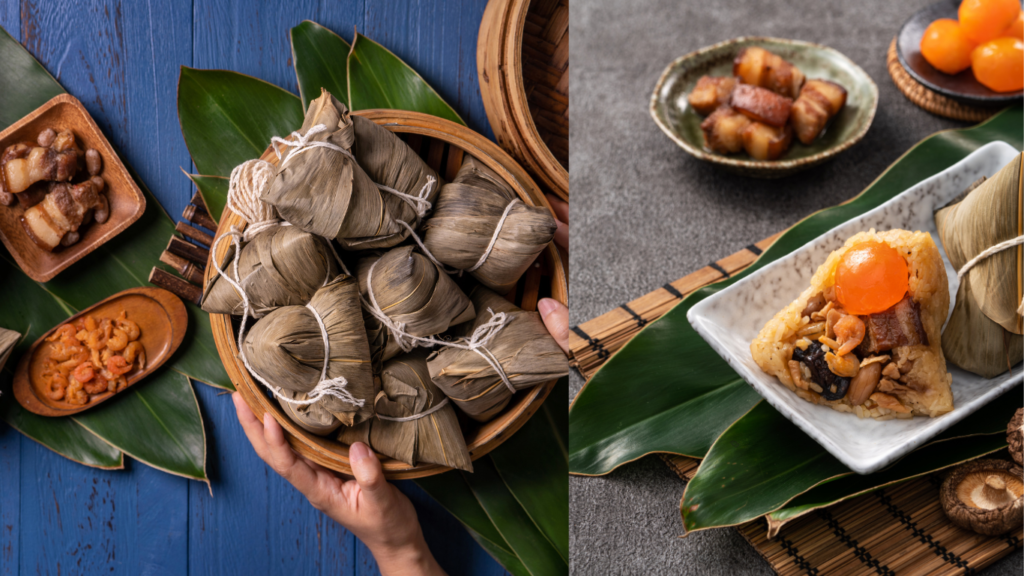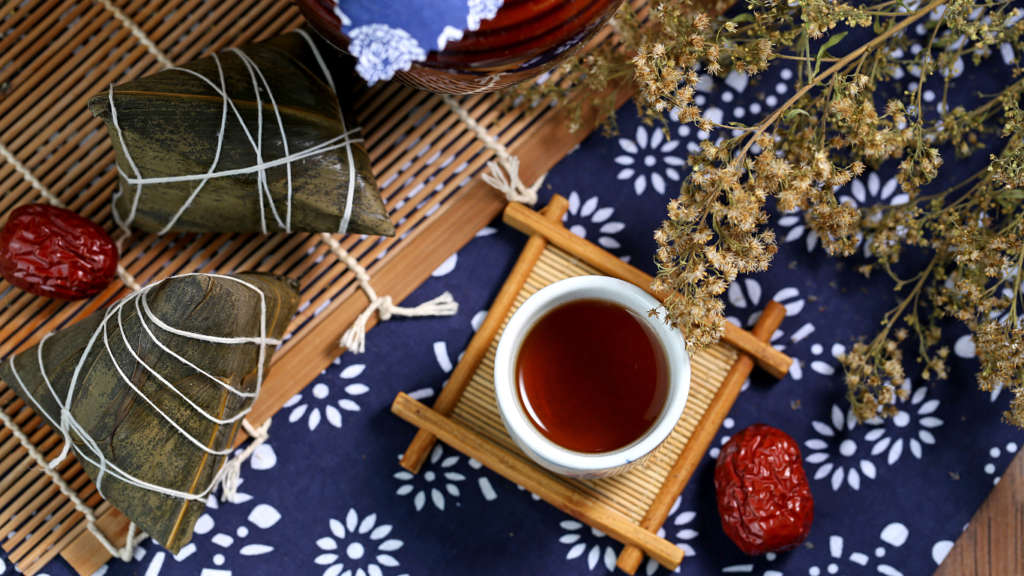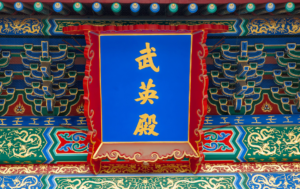The Chinese Dragon Boat Festival, also known as the Duanwu Festival, is a captivating and culturally rich celebration observed by millions worldwide. It’s a time when communities come together to commemorate the legendary poet Qu Yuan and participate in many fascinating traditions passed down through generations. In this blog, we delve into the heart of this festival and explore the eight remarkable traditions of the Chinese Dragon Boat Festival and what makes it such a unique and cherished event.
Dragon Boat Racing: The Pulse of the Festival

The spectacular dragon boat races are at the heart of the Dragon Boat Festival, an iconic tradition that pulses with excitement and tradition. These races are not merely sporting events but a vibrant celebration of Chinese culture and history. Let’s dive deeper into this tradition and explore why it is central to the festivities.
-
Dragon Boats: A Triumph of Craftsmanship
Dragon boats are an embodiment of meticulous craftsmanship and artistic design. These long and narrow vessels, often elaborately decorated with dragon heads and tails, are a sight to behold. They are a fusion of tradition and innovation, combining ancient boat-building techniques with modern materials.
-
The Spirit of Unity and Competition
Dragon boat racing is about more than just the boats; it’s about the spirit of unity and friendly competition that permeates the festival. Each boat typically accommodates a team of paddlers, ranging from 10 to 20 individuals, depending on the boat’s size. The synchronized paddling, accompanied by the rhythmic beating of drums, is a captivating spectacle that showcases teamwork and camaraderie. It is believed that the louder the drumbeat, the faster the boat will race, making the drummers essential to the team’s success.
-
Qu Yuan’s Legacy in Every Stroke
While the races are thrilling, they are also a poignant reminder of the festival’s historical roots. They pay homage to Qu Yuan, ancient China’s revered poet and statesman. According to legend, Qu Yuan drowned himself in the Miluo River in protest against government corruption. The dragon boat races originated from the desperate efforts of local fishermen to rescue his body by paddling out onto the river and throwing rice into the water to distract the fish from devouring him.
-
Modern Dragon Boat Racing
In the modern era, dragon boat racing has evolved into a global phenomenon. It is not limited to China; you can find dragon boat festivals and races in many countries worldwide. These events foster cultural exchange, friendship, and a shared appreciation for the Chinese Dragon Boat Festival traditions. It’s an excellent opportunity for people of diverse backgrounds to come together and celebrate this vibrant tradition.
Zongzi – Sticky Rice Dumplings That Tell a Story

One of the most cherished and delicious traditions of the Chinese Dragon Boat Festival is the preparation and consumption of zongzi, sticky rice dumplings that are steeped in history and symbolism. These tasty treats are not just a culinary delight; they also tell a captivating story that connects the present with the past.
-
The Art of Crafting Zongzi
Zongzi are meticulously crafted, reflecting the care and attention to detail that go into preserving tradition. They consist of soaked glutinous rice and then carefully wrapped in bamboo leaves, forming a distinctive pyramid shape. Inside, you’ll often find a variety of fillings, including meats, beans, nuts, or even sweet ingredients like jujubes or red bean paste. The choice of fillings can vary by region and personal preference.
-
A Historical Connection
The tradition of making and enjoying zongzi during the Dragon Boat Festival is deeply rooted in history. It originates from the desperate attempts of locals to save the body of the beloved poet Qu Yuan from being devoured by fish in the Miluo River. By tossing these rice dumplings into the water, they hoped to distract the fish, ensuring that Qu Yuan’s remains would be intact for proper burial. Thus, each zongzi carries a touch of history and a reverence for the poet’s memory.
-
Regional Variations
While the basic concept of zongzi remains consistent, regional variations add a delightful twist to this tradition. Different provinces and communities across China have their own unique recipes and styles for making zongzi. For example, in southern China, sweet zongzi with ingredients like lotus seeds and dates are more popular, whereas in the north, savory zongzi with meat and mushrooms are preferred. These regional variations make the tradition of zongzi a diverse and culturally rich aspect of the festival.
-
Symbolism and Tradition
Zongzi symbolizes more than a tasty treat; they symbolize unity, family, and remembrance. Families and friends often gather to prepare these dumplings together, reinforcing bonds and creating cherished memories. When enjoyed, zongzi carries the wishes of good fortune and protection. Some families even include small notes or messages inside the zongzi, adding an extra layer of meaning to the tradition.
Related topics:
Chinese Calligraphy and Painting: A Rich Cultural Legacy
Health Benefits of Chinese Calligraphy and Painting
Guanxi: Unlocking the Power of Relationships in Chinese Business
Hanging Acorus and Calamus: Warding Off Evil Spirits
Amidst the vibrant celebrations of the Chinese Dragon Boat Festival, another tradition quietly graces the homes of many: the hanging of Acorus and calamus plants. These aromatic herbs are believed to possess the power to ward off evil spirits and bring blessings to those who embrace this age-old custom.
-
Acorus and Calamus
A Fragrant Tradition Acorus and calamus, also known as sweet flag, are fragrant perennial plants that have been used in traditional Chinese medicine and cuisine for centuries. Their distinctive aroma is believed to have protective qualities, making them ideal for this festival’s tradition.
-
Protection and Spiritual Significance
The act of hanging acorus and calamus is deeply rooted in Chinese culture and folklore. These plants are believed to dispel negative energy, ward off evil spirits, and safeguard the home and its occupants. The practice reflects a desire for spiritual purification and protection during this auspicious time.
-
Placement and Arrangement
During the Dragon Boat Festival, it’s common to find bundles of Acorus and calamus hanging at doorways, windows, and various parts of the home. These bundles are often arranged to maximize their aromatic impact, ensuring the fragrance fills the living space. The act of hanging these plants is both a practical and symbolic gesture, creating a fragrant barrier against malevolent forces.
-
Harmony with Nature
Beyond their protective properties, acorus and calamus connect people with the natural world. Their presence in homes during the festival reminds them of the importance of living in harmony with nature and harnessing its gifts for well-being.
-
Regional Variations
As with many traditions, regional variations exist in the practice of hanging Acorus and calamus. Some may include additional herbs or plants in the bundles, while others might incorporate them into decorative arrangements. Regardless of the specific approach, the underlying purpose remains consistent: to bring peace, prosperity, and protection to the household.
Making and Wearing Silk Threads: A Symbol of Blessings
Amidst the vibrant traditions of the Chinese Dragon Boat Festival, the practice of making and wearing colorful silk threads stands as a symbol of blessings, camaraderie, and enduring connections. Let’s delve into this tradition and discover the intricate threads of meaning that bind it to the heart of the celebration.
-
Crafting Vibrant Silk Threads
Creating silk threads is a labor of love and artistry. Families and friends come together before the festival to weave intricate bracelets, anklets, or necklaces made from colorful silk threads. These threads are often adorned with small decorations, such as bells, beads, or charms, adding to their visual appeal.
-
Wishing Good Fortune and Protection
The act of making these threads is imbued with well-wishes for loved ones. The threads are believed to carry blessings of good fortune, protection, and happiness. As they are handcrafted with care and thoughtfulness, they become a tangible expression of love and friendship.
-
Tying Bonds of Friendship
The practice of tying silk threads onto the wrists of friends and family members fosters a sense of togetherness and unity. The act of binding these threads symbolizes the strengthening of bonds between individuals. It’s a way to express affection, gratitude, and a desire for lasting connections.
-
Carrying the Festival’s Spirit
Wearing these vibrant threads during the Dragon Boat Festival is a visible reminder of the spirit of the celebration. It connects individuals to the festival’s rich cultural heritage and traditions while inviting conversations and opportunities for sharing stories and experiences.
-
Variations in Design and Style
Much like other festival traditions, the design and style of these silk threads can vary by region and personal preference. Some may opt for simple, elegant designs, while others embrace more intricate patterns and vibrant colors. Regardless of the style chosen, the essence of bestowing blessings and forging connections remains constant.
Salted Duck Eggs: A Savory Delight
Amidst the sweet and aromatic traditions of the Chinese Dragon Boat Festival, a savory delight graces the festive table—salted duck eggs. These delectable eggs are more than just a culinary treat; they symbolize unity, friendship, and the festival’s spirit. Let’s delve into the story behind these flavorful eggs and their significance.
-
The Essence of Salted Duck Eggs
Salted duck eggs are a culinary marvel created through the art of preserving and flavoring. They are made by immersing duck eggs in a brine solution, which infuses them with a delightful saltiness. The result is a unique flavor that balances the richness of the yolk with the savory notes of salt.
-
A Symbol of Unity and Friendship
During the Dragon Boat Festival, sharing salted duck eggs is a cherished tradition that symbolizes unity and friendship. Just as the paddlers in a dragon boat work together in harmony to achieve their goal, the act of sharing these eggs reinforces the bonds of kinship and friendship. It’s a gesture that transcends mere food and carries with it the warmth of shared experiences.
-
Variations in Preparation
Much like other festival foods, there are regional variations in the preparation of salted duck eggs. Some may opt for lightly salted eggs, while others prefer a more intensely briny flavor. The yolks may range from creamy to crumbly, offering a spectrum of textures and tastes to delight the palate.
-
Versatility in Culinary Creations
Salted duck eggs are not limited to being enjoyed on their own. They are often used as a versatile ingredient in various dishes, from savory congee to rich mooncakes. Their unique flavor and texture make them a sought-after addition to traditional and modern recipes.
-
Sharing the Joy of the Festival
When families and friends gather during the Dragon Boat Festival, the act of sharing salted duck eggs becomes an integral part of the celebration. It’s a way to extend goodwill, express appreciation, and strengthen the ties that bind loved ones together.
Drinking Realgar Wine: Warding Off Harm

Among the fascinating traditions of the Chinese Dragon Boat Festival, one stands out for its unique and symbolic nature—drinking realgar wine. This bright orange-hued drink isn’t just a beverage; it’s believed to possess the power to ward off evil spirits and bring protection during the festival. Let’s explore the intriguing customs and significance surrounding realgar wine.
-
The Enigmatic Hue of Realgar Wine
Realgar wine derives its distinct color from realgar, an arsenic sulfide mineral. This mineral has been used in traditional Chinese medicine and rituals for centuries, thanks to its vivid orange hue. While arsenic may sound alarming, realgar wine is meticulously prepared to be safe for consumption in small quantities.
-
Protection and Purification
Drinking realgar wine during the Dragon Boat Festival is steeped in the belief that it can protect against negative energy and evil spirits. The festival is associated with the spirit of Qu Yuan, who is said to have drowned himself in protest against corruption. The bright color of realgar wine is thought to symbolize the power of sunlight, dispelling darkness and malevolent forces.
-
Traditional Preparation
Realgar wine is typically prepared before the festival by dissolving powdered realgar in rice wine or other alcoholic beverages. The mixture is left to settle, ensuring the safe consumption of the wine. Its vibrant orange hue characterizes the resulting drink, making it a striking addition to festival gatherings.
-
Drinking Rituals
Participating in the realgar wine tradition involves taking a small sip or two rather than indulging in large quantities. It’s common to raise a toast with family and friends, expressing well wishes for safety, good health, and protection during the festival. While the act of drinking realgar wine is primarily symbolic, it carries a deep sense of tradition and spiritual significance.
-
Regional Variations
As with many festival traditions, there are regional variations in the practice of drinking realgar wine. Some regions may choose to incorporate it into specific dishes or desserts, adding a distinctive flavor and symbolism to their festival cuisine.
The Legend of Bai Su Zhen and Xu Xian: A Tale of Love and Forgiveness

While the Chinese Dragon Boat Festival is celebrated with a focus on its traditional customs and rituals, there’s a deeper layer to this festival—the retelling of legends that embody timeless themes of love, transformation, and forgiveness. One such captivating tale associated with the festival is that of Bai Su Zhen and Xu Xian. Let’s step into the world of this legendary love story and explore its connection to the Dragon Boat Festival.
-
A Tale of Star-Crossed Lovers
The legend of Bai Su Zhen and Xu Xian is a classic Chinese folklore narrative that transcends time and culture. At its heart, it’s a story of forbidden love between a human and a serpent spirit, and it is often retold during the festival as a reminder of the complexities of human relationships and the enduring power of love.
-
The Serpent’s Transformation
The story unfolds when Bai Su Zhen, a white snake spirit, takes on human form and falls in love with Xu Xian, a mortal man. Their love is genuine and deep, but their union faces numerous challenges, including the disapproval of society and a Buddhist monk named Fa Hai, who sees Bai Su Zhen’s true identity as a serpent.
-
A Test of Love and Forgiveness
Throughout the tale, the themes of love and forgiveness are beautifully woven into the narrative. Despite their trials and tribulations, Bai Su Zhen and Xu Xian’s love for each other remains steadfast. The story teaches us about the power of love to transcend boundaries and the importance of forgiveness in mending broken relationships.
-
Symbolism and Connection to the Festival
The legend of Bai Su Zhen and Xu Xian is often retold during the Dragon Boat Festival to remind us of the festival’s deeper meanings. It encourages reflection on the complexities of human emotions and the significance of forgiveness, harmony, and unity—values that resonate with the festival’s spirit.
-
Modern Interpretations
Today, this timeless love story inspires various forms of artistic expression, including literature, theater, film, and television. It serves as a reminder that the themes of love, transformation, and forgiveness are universal and enduring, transcending cultural and temporal boundaries.












